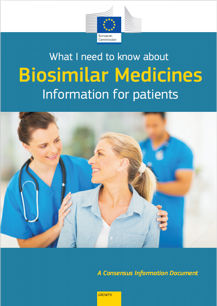




 Today, the European Commission published a unique Q&A for patients with reliable information on biosimilar medicines. Stakeholders value these efforts to provide unbiased, scientifically correct and yet easy to understand information on biosimilar medicines through the Q&A on Biosimilar Medicines, now available in 7 EU languages.
Today, the European Commission published a unique Q&A for patients with reliable information on biosimilar medicines. Stakeholders value these efforts to provide unbiased, scientifically correct and yet easy to understand information on biosimilar medicines through the Q&A on Biosimilar Medicines, now available in 7 EU languages.
This consensus information on biosimilar medicinal products was drafted for patients together with the European Medicines Agency (EMA), the European Commission and relevant stakeholders: the European Patients Forum (EPF), the European Federation of Crohn’s & Ulcerative Colitis Associations (EFCCA), the Standing Committee of European Doctors, European Federation of Pharmaceutical Industries and Associations (EFPIA), European Association for Bio-industries (EuropaBio) and Medicines for Europe.
Biological medicines (including biosimilar medicines) come from living organisms (cells) that have been modified using biotechnology. A biosimilar medicine is developed to be highly similar to an existing biological medicine and has the same biological activity. Biological medicines help treat or prevent many severe diseases including cancers, heart attacks, stroke, diabetes, and autoimmune diseases, such as rheumatoid arthritis, multiple sclerosis and inflammatory bowel disease. Biosimilar medicines have significant potential to create competition in the biological medicine market and provide broader affordable access to medicines for patients.
For the third year in a row, the European Commission will organise a multi-stakeholder workshop on biosimilar medicines 5 May 2017. This year, the focus will be on developing a Q&A for healthcare professionals.
About the Biosimilar Medicines Group
The Biosimilar Medicines Group is a sector group of Medicines for Europe and represents the leading companies developing, manufacturing and marketing biosimilar medicines across Europe. Our members bring competition to the biologic medicines market, thereby increasing access to highly innovative medical treatments to patients in Europe and around the world, and supporting the sustainability of the European healthcare systems.
For more information please follow us at www.medicinesforeurope.com and on Twitter @medicinesforEU.
Medicines for Europe Communications:
Doris Casares doris@medicinesforeurope.com /Andrea Bedorin abedorin@medicinesforeurope.com
About EFPIA
The European Federation of Pharmaceutical Industries and Associations (EFPIA) represents the pharmaceutical industry operating in Europe. Through its direct membership of 33 national associations and 39 leading pharmaceutical companies, EFPIA is the voice on the EU scene of 1,900 companies committed to researching, developing and bringing to patients new medicines that will improve health and the quality of life around the world.
EFPIA Communications Team:
communications@efpia.eu; +32 2626 2555
About EuropaBio
EuropaBio, the European Association for Bioindustries, promotes an innovative and dynamic European biotechnology industry. EuropaBio and its members are committed to the socially responsible use of biotechnology to improve quality of life, to prevent, diagnose, treat and cure diseases, to improve the quality and quantity of food and feedstuffs and to move towards a biobased and zero-waste economy. EuropaBio represents 75 corporate and associate members and bio regions, and 17 national biotechnology associations in turn representing over 1800 biotech SMEs.
Read more about our work at www.europabio.org.
EuropaBio Communications Team:
Cosmin Popa, c.popa@europabio.org, +32 2 739 11 73